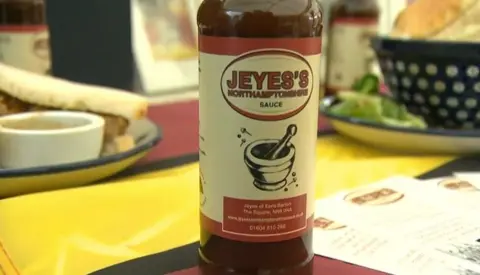Find five famous foods from Northamptonshire
 BBC
BBCWhile Stilton has its cheese, Melton Mowbray has its pies, Bakewell has its tart and Yorkshire has its pudding, foods celebrating Northamptonshire do not come readily to mind.
But, while the county is often known as the place you travel through to get somewhere else, it does have some culinary delights of its own.
From cheesecake to sauce, there is something for almost everybody.
To mark Northamptonshire Food and Drink Week, here are a few of them.
Jeyes's Northamptonshire Sauce
It was revived in 2020 by Jeyes of Earls Barton as a rival to the mighty Worcestershire Sauce.
It was invented by Philadelphus Jeyes who used secret recipes to create medicines, remedies and cooking ingredients in the 1800s.
Jeyes hopes to see a bottle of the sauce in every sauce cupboard in the UK and it says it is already used in pubs, delis and farm shops across the country.
Towcester Cheesecake

Despite the sound of the name, this is not a cheesecake you make in a grilling machine.
It was invented by the family of a well-known baker in Northamptonshire, Thomas Adams.
It is made from puff pastry and breadcrumbs with cheese curd and currants - no digestives were harmed in the making of this cheesecake.
It is not known where or even if it can be purchased now.
Brixworth Pate
A pate bearing the name of this Northamptonshire village was developed by Stuart Bates in the 1970s.
It is made from rich chicken livers and sold at local butchers and delis.
Ock n Dough
 Google
GoogleIf you have ever wondered why Wellingborough's football team is known as the dough boys, look no further than this popular dish.
A typical recipe includes pork hock, stewing beef, suet, lard, flour, sage and gravy.
Years ago, it would have been prepared at home and then taken to the local baker for cooking, as many families did not have large ovens.
Its name is immortalised in a local hostelry.
Weetabix
 Getty Images
Getty ImagesNorthamptonshire can claim Weetabix - a staple for many family breakfast tables.
The first box of the well-known cereal left the company's mills in Burton Latimer in 1932.
The firm was then known as the British and African Cereal Co Ltd, changing its name to Weetabix Ltd in 1936.
In the 1950s, it was used as an ingredient as much as a cereal, appearing in recipes for dinner dishes.
Follow Northamptonshire news on BBC Sounds, Facebook, Instagram and X.
